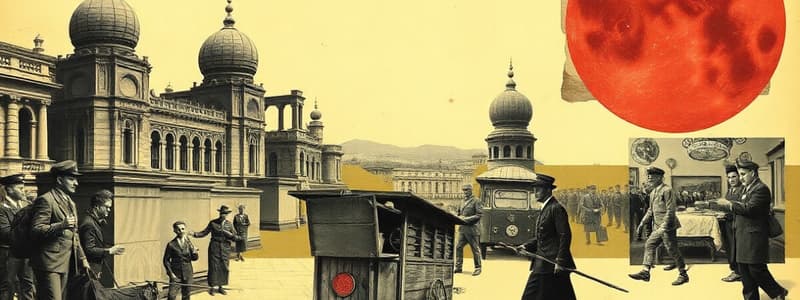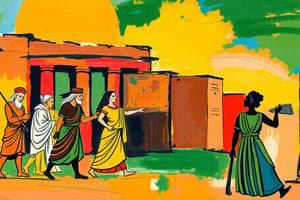Podcast
Questions and Answers
What is the time period associated with the Classical Antiquity?
What is the time period associated with the Classical Antiquity?
- 500 BCE - 500 CE (correct)
- 5th century - 15th century
- 14th - 17th centuries
- 3000 BCE - 500 CE
Which civilizations emerged during Ancient History?
Which civilizations emerged during Ancient History?
- Holy Roman Empire and Byzantium
- Indus Valley and Ancient Egypt (correct)
- Mughal Empire and Ottoman Empire
- Roman Empire and Greek city-states
What significant concept distinguishes primary sources from secondary sources?
What significant concept distinguishes primary sources from secondary sources?
- Primary sources are original documents/events. (correct)
- Primary sources are interpretations and analyses.
- Secondary sources are considered more accurate.
- Secondary sources provide firsthand accounts.
What era is characterized by the rebirth of art and learning, emphasizing humanism?
What era is characterized by the rebirth of art and learning, emphasizing humanism?
Who is known as the 'Father of History'?
Who is known as the 'Father of History'?
What term describes the study of how history is written and interpreted?
What term describes the study of how history is written and interpreted?
What was a significant outcome of the Industrial Revolution?
What was a significant outcome of the Industrial Revolution?
Which concept involves recognizing relationships without direct causation?
Which concept involves recognizing relationships without direct causation?
Flashcards are hidden until you start studying
Study Notes
Overview of History
- Definition: The study of past events, particularly in human affairs.
- Importance: Understanding historical context can explain current societal structures and cultural dynamics.
Major Periods in History
-
Prehistoric Era:
- Time before written records.
- Divided into Paleolithic (Old Stone Age) and Neolithic (New Stone Age).
-
Ancient History:
- Emergence of writing (~3000 BCE).
- Key civilizations: Mesopotamia, Ancient Egypt, Indus Valley, Ancient China, Mesoamerica.
-
Classical Antiquity:
- Approximately 500 BCE - 500 CE.
- Rise of empires: Roman Empire, Han China, Greek city-states.
- Significant developments in philosophy, science, and art.
-
Middle Ages:
- 5th century - 15th century.
- Feudalism, rise of Christianity and Islam, Crusades, and the Black Death.
-
Renaissance:
- 14th - 17th centuries.
- Rebirth of art and learning; emphasis on humanism, advances in science.
-
Early Modern Period:
- 16th - 18th centuries.
- Age of Exploration, Protestant Reformation, Enlightenment, and emergence of nation-states.
-
Modern History:
- Late 18th century to present.
- Industrial Revolution, World Wars, Cold War, globalization.
Key Concepts in Historical Study
-
Primary vs. Secondary Sources:
- Primary: Original documents/events (diaries, artifacts).
- Secondary: Interpretations of primary sources (history books).
-
Historiography: The study of how history is written and interpreted.
-
Causation vs. Correlation:
- Causation: Identifying causes of historical events.
- Correlation: Recognizing relationships without direct causation.
-
Historical Perspectives: Viewing history through different lenses (economic, social, political).
Notable Historians and Their Contributions
- Herodotus: Often called the "Father of History" for his work "Histories".
- Thucydides: Focused on accuracy and critical approach to history.
- Marc Bloch & Lucien Febvre: Co-founders of the Annales School, emphasized "la longue durée".
Importance of History in Society
- Cultural Identity: Shapes national narratives and personal identity.
- Lessons Learned: Helps prevent the repetition of past mistakes.
- Informed Citizenship: Enables individuals to make informed decisions based on historical context.
Definition of History
- The study of past events, especially those affecting human affairs.
Importance of History
- Understanding past events helps explain current societal structures and cultural dynamics.
Prehistoric Era
- The time period before the development of written records.
- Divided into the Paleolithic (Old Stone Age) and Neolithic (New Stone Age) periods.
Ancient History
- Emergence of writing around 3000 BCE.
- Key civilizations: Mesopotamia, Ancient Egypt, Indus Valley, Ancient China, Mesoamerica.
Classical Antiquity
- From approximately 500 BCE to 500 CE.
- Rise of major empires such as the Roman Empire, Han China, and Greek city-states.
- Significant developments in philosophy, science, and art.
Middle Ages
- 5th century to 15th century.
- Marked by feudalism, the rise of Christianity and Islam, the Crusades, and the Black Death.
Renaissance
- 14th to 17th centuries.
- A period of renewed interest in art, literature, and learning; characterized by humanism and advancements in science.
Early Modern Period
- 16th to 18th centuries.
- Significant events include the Age of Exploration, the Protestant Reformation, the Enlightenment, and the emergence of nation-states.
Modern History
- Late 18th century to the present.
- Characterized by the Industrial Revolution, World Wars, the Cold War, and globalization.
Primary vs. Secondary Sources
- Primary sources: Original documents, artifacts, or eyewitness accounts.
- Secondary sources: Interpretations of primary sources (history books, articles, etc.)
Key Concepts in Historical Study
- Historiography: The study of how history is written and interpreted.
- Causation vs. Correlation:
- Causation: Identifying causes of events.
- Correlation: Recognizing relationships between events without direct causation.
- Historical Perspectives: Viewing history from different perspectives (economic, social, political).
Notable Historians
- Herodotus: Often called the "Father of History" for his work "Histories."
- Thucydides: Known for his accuracy and critical approach to historical events.
- Marc Bloch & Lucien Febvre: Co-founders of the Annales School, which emphasized the long-term historical trends.
Importance of History in Society
- Cultural Identity: History shapes national narratives and individual identities.
- Lessons Learned: History helps prevent the repetition of past mistakes.
- Informed Citizenship: Understanding history enables individuals to make informed decisions based on historical context.
Studying That Suits You
Use AI to generate personalized quizzes and flashcards to suit your learning preferences.




